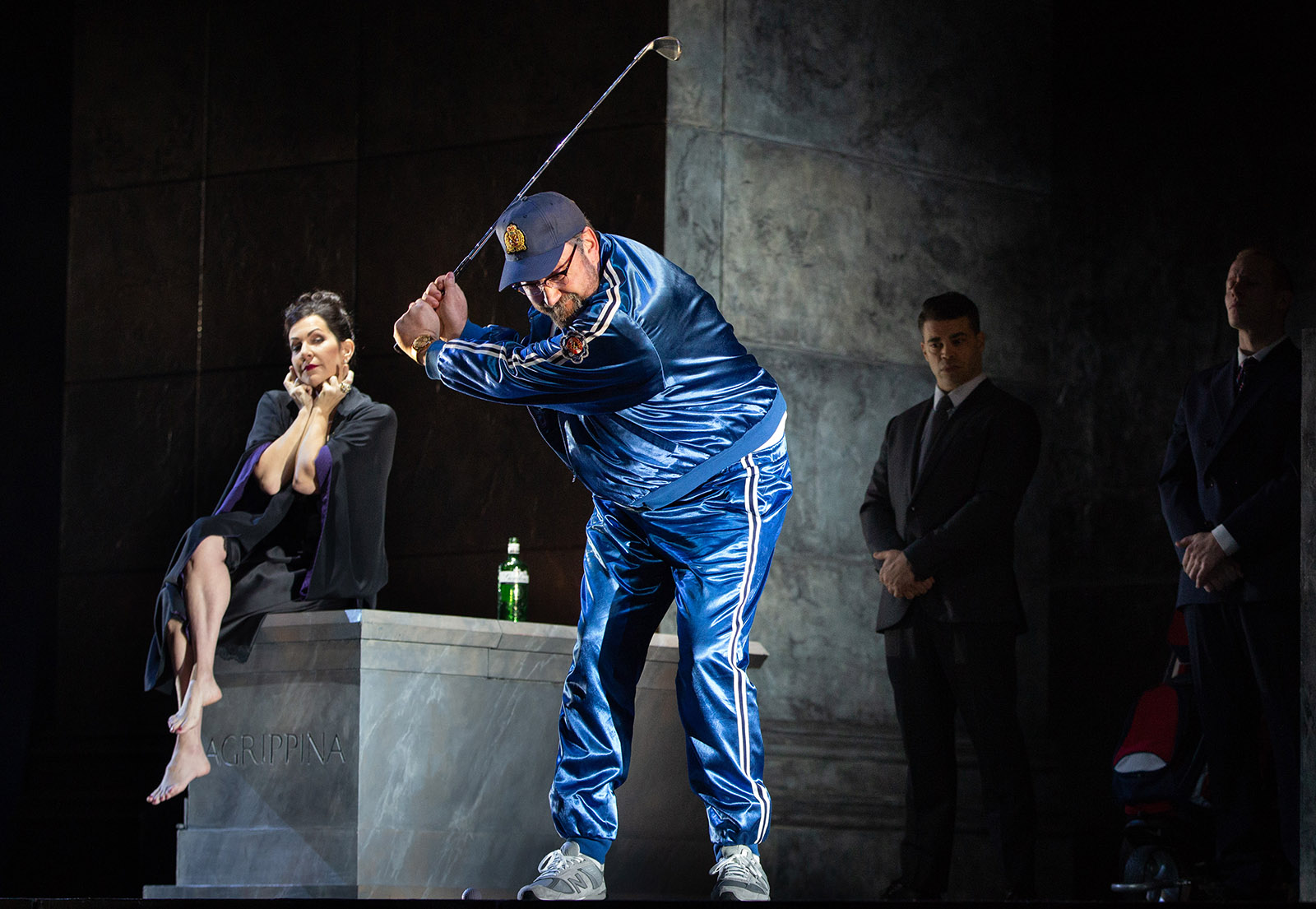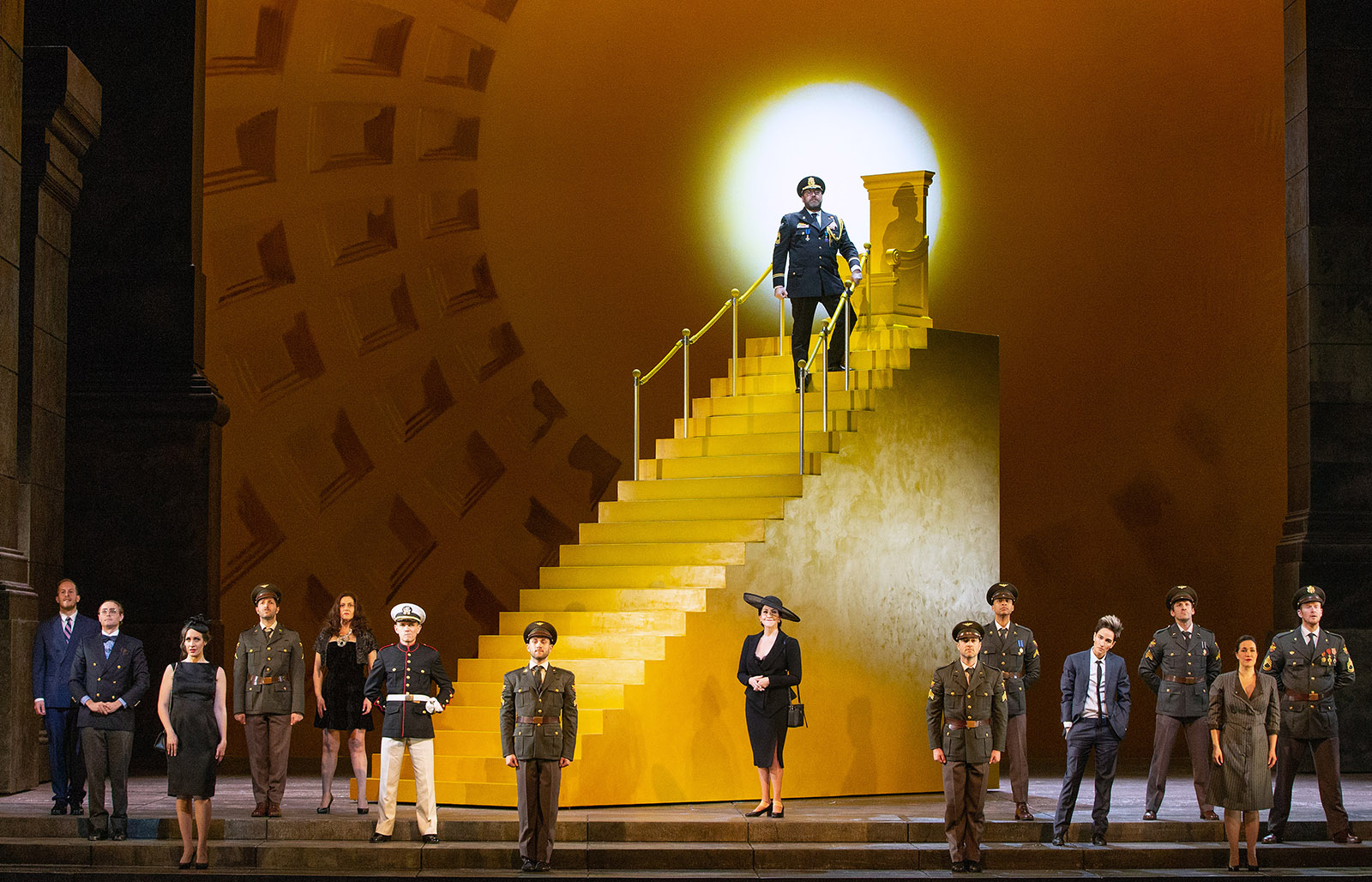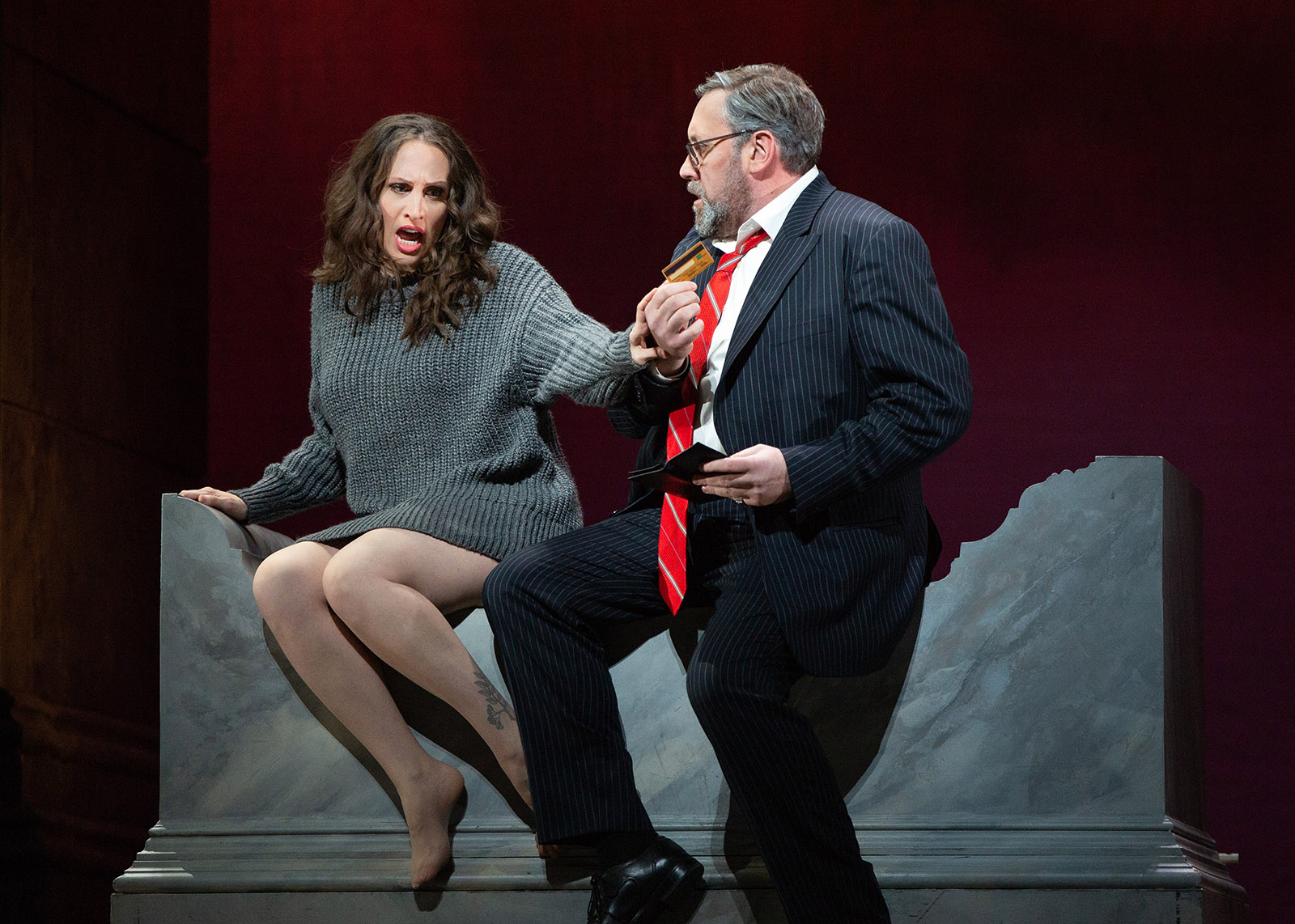The court of Claudius and Nero has often provided a prism through which to view political life, and never more so than in the age of Trump; a new anti-Trump book appearing next month, co-authored by the former White House ethics counsel Richard Painter, is titled American Nero. Agrippina, the Handel opera now premiering on the Metropolitan Opera’s stage, may have been written as a satire on the politics of its own time, but in the hands of producer David McVicar, and set in the present day, it offers a timely paradigm of hypocrisy, corruption, and sexual manipulation in the halls of power.
This is not the first time McVicar has used Handel’s Roman settings to comment on contemporary themes. His Giulio Cesare, first produced in 2005 in the early years of the Iraq War (and returning to the Met next March), was set in the Egypt of the nineteenth-century British occupation rather than that of Cleopatra’s time, bringing concerns over Western imperialism and Middle East adventurism to bear on an ancient story. In Agrippina, McVicar puts microphones, television cameras, and cell phones into the hands of the “Roman” imperial family, suggesting that political power, then as now, comes as much through spin and messaging as from the barrel of a gun. He even costumes the patriarchal ruler of Rome, the Emperor Claudius (here called Claudio, and played by Matthew Rose), in a suspiciously long and loud red necktie, recalling the even more pointed costume design of the Public Theater’s 2017 Julius Caesar.
The contemporary trappings are not so prominent, though, as to obscure the historical roots of the libretto—the work of Vincenzo Grimani, a worldly Italian cardinal, whose antipathy toward Clement XI, the pope under whom he served, underlies his jaundiced treatment of Claudius and his court. McVicar uses deft touches to bring out the dark ironies that those who lived in Grimani’s age, steeped in the writings of Tacitus and Suetonius, would have spotted more readily than we might. Handel’s bright, lively score, featuring an unusually high number of upper-range voices—one of the male roles, originally written for a castrato, is in the Met’s production performed by a woman—seems to mock the sobriety of these grim Roman historians.
Foremost among the opera’s ironies is Agrippina herself (Joyce DiDonato), domineering and conniving throughout the span of this opera, but in real life destined, in the years that would follow, to be hoist by her own petard. Her descent from Augustus, founder of the imperial state, gave her enormous authority and made her son, Nero (here Nerone, played by Kate Lindsey), a prime candidate for the emperor’s title. (McVicar uses a backdrop in Act I that shows the family trees of the main characters, highlighting how their bloodlines defined their status.) Historical sources depict her as a scheming seductress who controlled a besotted Claudius, her uncle, through sex, persuading him not only to marry her (for which purpose he got the Senate to legalize avunculate marriage), but to adopt Nero as his presumptive heir. Grimani’s libretto makes the succession question the principal driver of his plot, leading to a climactic scene in which Nero, practically dancing to Handel’s vibrant score, triumphantly ascends to the throne, which McVicar places atop an immense golden staircase, a ladder to the stars.
But all is not as it seems, for Nerone/Nero, as we know, will become a delusional, depraved despot, who will one day assassinate his mother, first sending her to sea in a trick collapsing boat, and then, after she miraculously escapes drowning, having her clubbed to death. The Met production of Handel’s opera includes a grim omen of this murder in a final scene, when Nerone, now assured of rule, makes a strangling gesture, seen only by the audience, from behind Agrippina’s back. The herky-jerky dance steps he performs as he climbs the golden staircase suggest the profound instability of Rome’s heir apparent, as does a wonderfully irreverent scene in which he frenetically cuts lines of cocaine in time with the lively aria “Come nube che fugge dal vento” (Like a cloud that flees from the wind).
Agrippina’s triumph will bring Rome’s defeat and her own demise. But that is in the future: at the opera’s end, she reclines happily on a stone pedestal that resembles both a dining couch and a sarcophagus, ensconced next to Claudio, the husband to whom, according to Tacitus, she will shortly feed a poisoned dish of mushrooms.
But Agrippina is not just a winking satire of Roman history, it’s also a mash-up with a plot that disobeys strict chronology. It brings into the same era as Claudius and Agrippina Poppaea Sabina, so that she can be simultaneously wooed by both Claudio and the testosterone-driven adolescent, Nerone. (In fact, Poppaea came on the imperial scene only in the later years of Nero’s reign, long after Claudius was dead—though the emperor did then fall hard for her and married her, much to Rome’s displeasure.) Poppaea appears here, played by Brenda Rae, in a guise utterly unlike the cheap, brazen seductress depicted by Roman sources. Grimani makes her a butterfly rather than a spider woman: an ingénue clinging to the pure love she shares with Ottone (Iestyn Davies), a loyal officer in Claudio’s retinue, despite the threats posed by Agrippina’s schemes and Claudio’s concupiscence.
Ottone, of course, is none other than the historical figure Otho, a crony of Nero’s who was anything but the paragon of virtue depicted here. Where Grimani has him declare “Pria, che mancarti, oh bella, mille volte morrò”—I will die a thousand deaths before I fail you—his historical counterpart gave up Poppaea to Nero, perhaps in a bid to win imperial favor. The petulant emperor ultimately caused Poppaea to fatally miscarry by kicking her in the belly, before being ousted from power and taking his own life.
Agrippina the opera may thus appear as a bizarrely comic prequel to a nightmarish era of Roman history, as McVicar seems to hint by putting the ensemble atop a row of funereal plinths at the end of the production. Only the servant Lesbus, a figure invented by Grimani, sits apart on the stage during the finale, laughing as the curtain descends. He holds a book in hand—a copy of Tacitus, as one discerns through opera glasses, in which these grim destinies can be read. He alone stands outside history, observing its perverse twists from an ironic distance.
Even while adding this device, Grimani subtracted a character who figured in all other depictions of the Neronian age, and who loomed especially large in Monteverdi’s L’Incoronazione di Poppaea, the better-known opera set during this period of Roman history. The Stoic philosopher Seneca was a central figure in the courts of both Claudius and Nero; he tried to temper Nero’s murderous impulses before finally falling victim to them himself. His sober presence among these scheming royals struck many dramatists as thematically important, beginning with the anonymous author of Octavia, a historical tragedy written just after its principal characters had passed from the scene. Monteverdi’s librettist relied on this Roman play, as well as the account of Tacitus, in making Seneca the moral center of L’Incoronazione di Poppaea and staging his forced suicide as a vivid counterpoint to the grotesque gaiety of Poppaea’s marriage to Nero.
Agrippina’s excision of Seneca is noticeable and significant, as McVicar seems to have understood. Without the center of gravity that Seneca’s death provided, Grimani’s imperial Romans float free in a world without consequences, untethered to their historical avatars. Agrippina and company go merrily about pursuing sex and power, unconstrained by the ethical concerns Seneca might have voiced, heedless of the upheavals that will soon destroy their plans and set them at one another’s throats.
McVicar tops off the Met production with an excision of his own. Grimani’s libretto called for Juno to descend from Olympus in the final ensemble, blessing the entire cast as they sing the exultant “Lieto il Tebro increspi l’onda” (Happy roll the Tiber’s waves). Here, no goddess appears and the court receives no blessing. The mocking laughter of the servant Lesbus, and the grim image of the dead and desiccated Roman wolf that descends behind him, seem more like their curse.
Agrippina, by George Frideric Handel, is at the Metropolitan Opera, New York City, through March 7.






